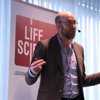Fritextsökning
Artiklar per år
Innehållstyper
-

Lämnar tankesmedjan efter åtta år: ”Oerhört inspirerande att driva på innovation”
Catharina Barkman har under åtta år drivit den oberoende tankesmedjan Forum för Health Policy. I slutet av sommaren går hon vidare till nya utmaningar och nu blickar hon tillbaka på tiden, uppdragen och på hur svensk hälso- och sjukvård har utvecklats.
-

Nobelpristagaren Torsten Wiesel fyller 100: ”Gamla gubbar som jag ska använda erfarenheten till att hjälpa de unga”
Året var 1955 när en ung Torsten Wiesel hoppade på båten till USA och inledde en sagolik karriär som hjärnforskare med ett Nobelpris som kronan på verket. Nu fyller han 100 år och ser tillbaka på ett intensivt liv – och på uppväxten i Bromma som formade hans vilja att hjälpa samhällets svaga.
-

Event om biologiska läkemedel igång i Köpenhamn
Nu har Life Science Swedens event New Horizons in Biologics & Bioprocessing startat i Köpenhamn. Talare från akademin och från industrin medverkar under dagen.
-

Innovative start-up helps doctors, scientists and industry balance coagulation risks
For many doctors caring for seriously ill patients, for example, in stroke units and cancer wards, maintaining the life-saving balance between bleeding and thrombosis is an ongoing challenge. In the late 1980s, scientists at Maastricht University in the Netherlands developed an innovative method, the thrombin generation assay (TGA), which provides a complete overview of a physiological process crucial for maintaining normal haemostasis.
-

“Conducting research at universities is becoming more and more like working at a research hotel”
The government wants Swedish research to focus on excellence and innovation, but can the two be combined? Life Science Sweden talks to Anna Falk, a professor at Lund University, about research policy, the constant hunt for funding in academia and what constitutes ‘fine research’.
-

Samuel Lagercrantz: “Companies that do this successfully will take the lead”
The development of new medicines and medical technologies should not focus too narrowly on prolonging life. It is equally important to develop treatments that relieve pain or eliminate painful symptoms, writes Samuel Lagercrantz in an editorial.
-

Bayer has cut 1,500 roles – so far
German chemical and pharmaceutical group Bayer cut more than 1,500 roles in the first quarter alone– and most of them were management positions.
-

Total pipeline of pharmaceutical companies reaches a record high – 22,921 medicines are currently being developed
Despite the difficult economic times, pharmaceutical companies have never developed as many new drugs as now.
-

Lundabolag får brittiskt miljonbidrag för blodtest
Lundabolaget Prolight Diagnostics har fått ett statligt brittiskt bidrag på 17 miljoner kronor för fortsatt utveckling av ett blodtest som ska upptäcka eller utesluta hjärtinfarkt.
-

Petter Hartman: ”Ökad kapacitet kräver innovation”
Om framtidens vårdbehov ska kunna mötas måste det systematiska innovationsarbetet hamna högre upp i prioriteringsordningen, skriver Petter Hartman i en krönika.
-

Substansnamn ska bli den röda tråden inom vården
Mer enhetliga namn på utbytbara läkemedel är målet för ett uppdrag som Läkemedelsverket fått av regeringen. Data för alla drygt 14 000 godkända läkemedel finns nu förberedda.
-

Carl Borrebaeck – professor and serial entrepreneur with a taste for speed
Award-winning cancer researcher, the founder of many listed companies, and constantly in the academic and commercial spotlight for decades. However, Carl Borrebaeck, Professor of Immunotechnology at Lund, is not yet satisfied. “We have a new, potentially super exciting project in the pipeline,” he says.
-

Ancient DNA provides new insights – “The immune system lost its job”
Ancient bone remains from our ancestors have provided new insights into the prevalence of multiple sclerosis. By looking back in time, researchers can provide a possible explanation for why the disease is more prevalent in northern Europe.
-

KI’s freezer fiasco investigated: A chain of failures
A chain of combined technical and organisational shortcomings caused the freezer breakdown at the Karolinska Institute during the Christmas holidays, destroying more than 47,000 samples. This was the conclusion of an internal investigation.
-

Svensk smärtapp får patent i Europa
Lundbaserade Paindrainer har beviljats europeiskt patent för sin AI-baserade plattform för hantering av kronisk smärta.
-

The Covid pandemic accelerated the development of cancer vaccine
The Covid pandemic gave a major boost to the vaccine field. The Danish biotech company Expres2ion Biotechnologies, which is developing a vaccine against breast cancer, testifies to this.
-

The life science strategy – what the industry wants
The process of updating the national life science strategy has begun at the government’s life science office. According to industry stakeholders, Sweden’s competitiveness, the accessibility of health data and the integration of innovation in healthcare are some of the points that are essential to review.
-

Han utvecklar AI-modeller för cancerdiagnostik
Det finns ett stort behov för tids- och kostnadseffektiv precisionsdiagnostik vid cancer. Det menar forskaren Mattias Rantalainen som arbetar med att ta fram lösningar baserad på artificiell intelligens.
-

”We need compatibility“
Penilla Gunther, founder of Fokus Patient and chair of the European Patient Safety Foundation, hopes that the forthcoming life science strategy will focus on efficient and secure management of patient data and equal access to medicines.
-

Anna Törner: ”Orphan Designation – the "petite robe noire" of drug development”
It is easy to cling to various regulatory incentives, like orphan designation, and other expedited pathways, without understanding what they truly mean or whether they are indeed right (or wrong) for the current project, Anna Törner writes in a column.
-

Specific proposals and targets top the universities’ desired priorities
What are the universities’ expectations for the update of the national life science strategy? Life Science Sweden posed the question to representatives from Karolinska Institutet and Sahlgrenska Academy.
-

Anna Törner: ”Orphan designation läkemedelsutvecklingens ’petite robe noire’”
Det är så lätt att klamra sig fast vid olika regulatoriska incitament, som orphan designation, utan att egentligen veta vad de innebär och på vilket sätt de kan vara rätt (eller fel), skriver Anna Törner i en krönika.
-

Erfaren medtechledare tar över klubban i Realheart
Medtechbolaget Realheart, som utvecklar ett artificiellt hjärta, har utsett Magnus Öhman till arbetande styrelseordförande.
-

Venom from the deathstalker carries radiopharmaceuticals to the brain
In order to target cancerous brain tumours with radionuclides, the problematic blood-brain barrier must first be crossed. Life Science Sweden has visited a KI researcher who is trialling an unusual approach ‒ using scorpion venom.